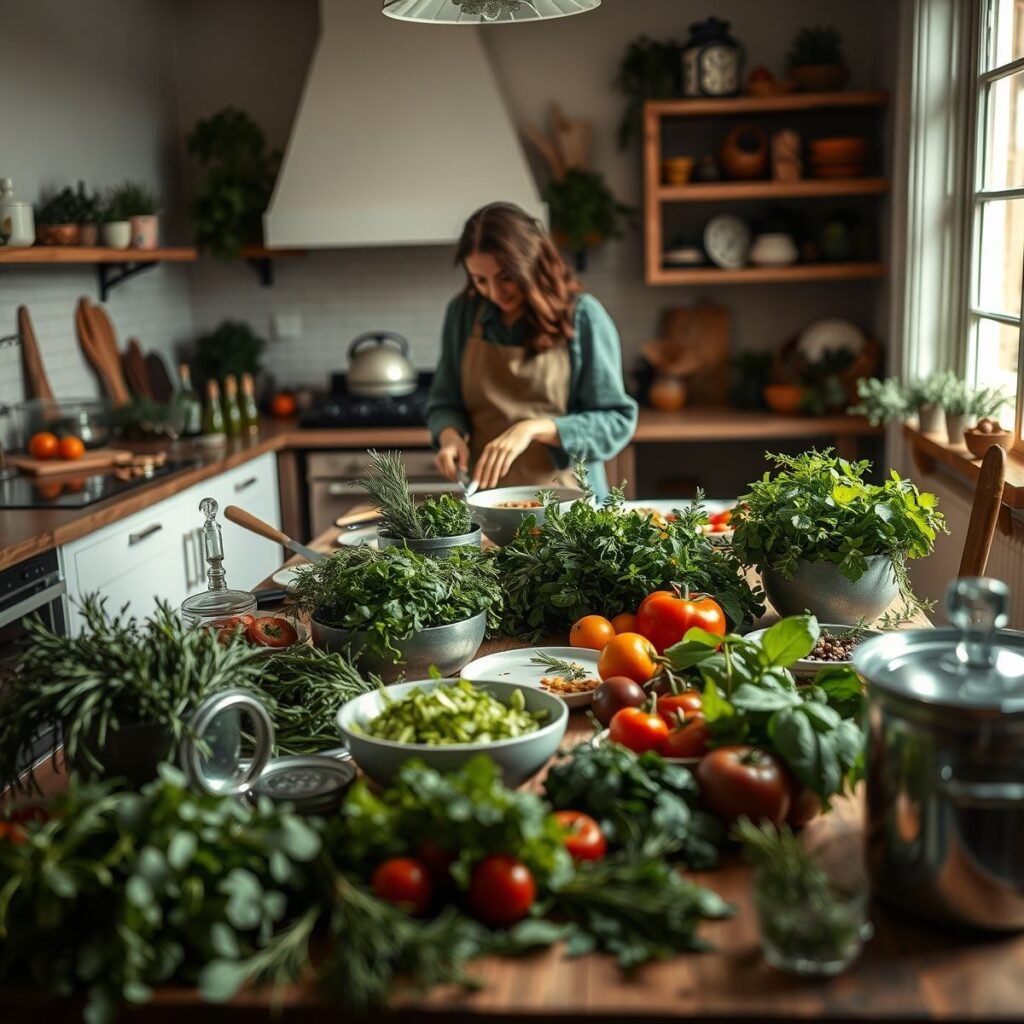Índice do Conteúdo
- Aromatic Herbs in Cooking
- Ever Thought Cooking Wasn’t for You? Think Again.
- Rosemary: A Robust Flavor Enhancer
- Thyme: Versatile and Subtle
- Basil: The Sweet Aroma of Italian Cuisine
- Cooking Techniques Using Aromatic Herbs
- Infusing Oils with Aromatic Herbs
- Herb-Seasoned Broths and Stocks
- Marinades Featuring Aromatic Herbs
- Using Fresh vs. Dried Herbs
- Combining Aromatic Herbs for Complex Flavors
- Graduation Gift They’ll Actually Use
Aromatic Herbs in Cooking
Aromatic herbs are essential components in cooking, enhancing flavors and aromas in a variety of dishes. Herbs such as rosemary, thyme, and basil not only provide distinct tastes but also offer numerous health benefits. These herbs can elevate simple recipes into gourmet meals, making them a staple in kitchens around the world.
Rosemary: A Robust Flavor Enhancer
Rosemary is known for its strong, woody flavor, making it ideal for roasted meats, particularly lamb and chicken. Its needle-like leaves can be used fresh or dried, and its oils are often infused into marinades. When cooking with rosemary, it’s recommended to use it in moderation, as its potent flavor can overpower milder ingredients.
Thyme: Versatile and Subtle
Thyme is a versatile herb that pairs well with a wide range of dishes, from soups and stews to roasted vegetables and meats. Its subtle earthy flavor can enhance both savory and sweet recipes. When using thyme, fresh leaves are preferred, but dried thyme can also be a convenient alternative. The herb is often added at the beginning of the cooking process to allow its flavors to meld with other ingredients.
Basil: The Sweet Aroma of Italian Cuisine
Basil is a key ingredient in Italian cuisine, known for its sweet and slightly peppery flavor. It’s commonly used in pasta sauces, salads, and as a garnish for pizzas. To maximize its flavor, basil should be added towards the end of cooking or used fresh, as prolonged heat can diminish its aromatic qualities.
Cooking Techniques Using Aromatic Herbs
Incorporating aromatic herbs into your cooking involves various techniques that can enhance the overall flavor profile of dishes. Techniques such as infusion, where herbs are steeped in oils or broths, can extract their essential oils and flavors. Additionally, bruising herbs before adding them to dishes can release their aromatic compounds, resulting in a richer taste.
Infusing Oils with Aromatic Herbs
Infusing oils with aromatic herbs like rosemary and thyme is a wonderful technique to enhance your culinary creations. Simply heat oil gently with fresh herbs to extract their flavors, creating a fragrant oil that can be drizzled over dishes or used in dressings. This method allows you to enjoy the essence of these herbs even when they are not in season.
Herb-Seasoned Broths and Stocks
Creating herb-seasoned broths and stocks is another effective cooking technique that utilizes aromatic herbs. By simmering herbs such as thyme and basil in water or stock, you can develop a flavorful base for soups, risottos, and sauces. This method not only adds depth to dishes but also allows for the infusion of beneficial nutrients from the herbs.
Marinades Featuring Aromatic Herbs
Marinades are an excellent way to incorporate aromatic herbs into your cooking. Combining chopped rosemary, thyme, or basil with oil, vinegar, and other spices creates a flavorful marinade for meats and vegetables. Allowing the ingredients to marinate for several hours or overnight can significantly enhance the overall taste, resulting in tender and aromatic dishes.
Using Fresh vs. Dried Herbs
When cooking with aromatic herbs, it’s important to understand the differences between fresh and dried herbs. Fresh herbs typically offer a more vibrant flavor and aroma, while dried herbs are more concentrated. As a general rule, use three times the amount of fresh herbs when substituting for dried ones. Adjusting cooking times based on the form of the herb can also impact the final dish.
Combining Aromatic Herbs for Complex Flavors
Combining different aromatic herbs can create complex flavor profiles that enhance your dishes. For instance, pairing rosemary with thyme can add depth to roasted meats, while basil and thyme work well together in Mediterranean recipes. Experimenting with various combinations can lead to unique and delicious outcomes in your cooking.



